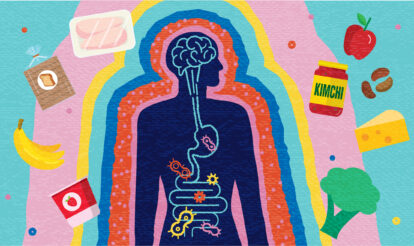
Taking antibiotics? Don’t forget your probiotic
Taking antibiotics? Don’t forget your probiotic

Antibiotics are important life-saving medicines, and their use often increases during cold and flu season when there’s a greater risk of a cold or virus turning into a serious bacterial infection. However, despite their medical benefits, taking antibiotics can have an effect on your gut. Here’s why it’s a good idea to use probiotics in combination with your antibiotics.
The Side Effects of Antibiotics
Antibiotics work by killing bacteria that make you sick or slowing their growth and spread. But while antibiotics are targeting harmful bacteria, they also unintentionally kill off the friendly bacteria in your digestive tract.
Trillions of these beneficial bacteria and other microbes live in your body – the majority in your digestive tract or gut – and are known as your gut microbiome. A healthy gut microbiome influences your health in many ways, including:
-
Producing some of your vitamins
-
Digesting certain foods
-
Maintaining the health and integrity of your intestinal lining
-
Producing compounds that strengthen the lining of your digestive tract
- Supporting your immune system by fighting off harmful bacteria and toxins.
Although antibiotics are a great way to treat certain infections, they can potentially disrupt the balance of beneficial bacteria in your gut microbiome. These friendly bacteria become less abundant and can be replaced by pathogenic bacteria (ones that cause disease) leaving you more vulnerable to other infections. You may also experience uncomfortable digestive symptoms such as an upset stomach, gas, bloating, or diarrhea. ¹
How Probiotics Can Help
Interestingly, between 5-49% of us who take antibiotics develop antibiotic-associated diarrhea which can happen any time from when we start taking them until up to two months afterwards. ²
Taking probiotics at the same time can help reduce the risk of antibiotic-associated diarrhea. ²,³
Probiotics are live microorganisms – the same as or similar to those that occur naturally in your gut – and when you consume them in recommended amounts, they work by enhancing your microbiome with additional beneficial bacteria and yeasts. In other words, probiotics help replace some of the friendly bacteria that are inadvertently killed off by antibiotics. Plus, there is no evidence that probiotics impact the effectiveness of the antibiotics. 2,3
Some probiotic species that are most helpful for use with antibiotics include: ²,³
-
Lactobacillus rhamnosus
-
Saccharomyces boulardii
-
Lactobacillus casei (for diarrhea caused by Clostridium difficile, a severe infection)
How to Take Probiotics with Antibiotics
You don’t have to wait until you are on antibiotics to start using a probiotic, as they are beneficial anytime. This will provide a healthy and diverse microbiome and support your digestive tract every day. However, if you are starting a course of antibiotics, you should ask your healthcare provider if they would recommend you starting a probiotic at the same time.
-
Choose a probiotic with species and strains that have been shown to help prevent antibiotic-associated diarrhoea, such as L. rhamnosus or S. boulardii.
-
Take the probiotic at least two hours before or after your antibiotic to ensure the antibiotic won’t harm the live bacteria in the probiotic.
-
Always take your antibiotic as directed and for as long as recommended, even if you’re feeling better. Continue your probiotic for at least two months after your antibiotic to help repopulate your microbiome with healthy microbes.
-
Probiotics are considered safe and effective for most people, but they’re not recommended for those with a compromised immune system.
Other Ways to Support Your Microbiome
Your gut microbiome is important for your overall health, including enhancing your immune system and fighting harmful bacteria, so it’s important to support your friendly bacteria every day. Besides taking a daily probiotic, these tips can help keep your microbiome healthy and happy: ⁴,5
-
Eat healthy, fibre-rich foods which contain prebiotics, a source of food for probiotics. Eating more fibre helps your gut microbiome survive and thrive.
-
Try to exercise outdoors every day as physical activity promotes a healthy microbiome. You’ll also get the benefit of vitamin D from the sun, which supports your immune system, and can keep you healthy and prevent the need for antibiotics.
-
Aim for eight hours of sleep each night and try to manage stress. Poor quality sleep or disruptions in your sleep and chronic stress harm your microbiome and are linked with dysbiosis (an imbalance in your gut bacteria).
In conclusion, a healthy microbiome is vital to your health, so try to do all you can to support it, especially during cold and flu season. If you need to take an antibiotic, be aware of the potential side effects on your microbiome, and make sure you take a probiotic, too.
REFERENCES
1. Dudek-Wicher RK, Junka A, Bartoszewicz M. The influence of antibiotics and dietary components on gut microbiota. Prz Gastroenterol. 2018;13(2):85-92. doi:10.5114/pg.2018.76005 https://www.ncbi.nlm.nih.gov/pmc/articles/PMC6040098/
2. Cai J, Zhao C, Du Y, Zhang Y, Zhao M, Zhao Q. Comparative efficacy and tolerability of probiotics for antibiotic-associated diarrhea: Systematic review with network meta-analysis. United European Gastroenterol J. 2018;6(2):169-180. doi:10.1177/2050640617736987 https://www.ncbi.nlm.nih.gov/pmc/articles/PMC5833232/
3.Blaabjerg S, Artzi DM, Aabenhus R. Probiotics for the Prevention of Antibiotic-Associated Diarrhea in Outpatients-A Systematic Review and Meta-Analysis. Antibiotics (Basel). 2017;6(4):21. Published 2017 Oct 12. doi:10.3390/antibiotics6040021
https://www.ncbi.nlm.nih.gov/pmc/articles/PMC5745464/
4. Conlon MA, Bird AR. The impact of diet and lifestyle on gut microbiota and human health. Nutrients. 2014;7(1):17-44. Published 2014 Dec 24. doi:10.3390/nu7010017 https://www.ncbi.nlm.nih.gov/pmc/articles/PMC4303825/
5. Smith RP, Easson C, Lyle SM, Kapoor R, Donnelly CP, Davidson EJ, Parikh E, Lopez JV, Tartar JL. Gut microbiome diversity is associated with sleep physiology in humans. PLoS One. 2019 Oct 7;14(10):e0222394. https://journals.plos.org/plosone/article?id=10.1371/journal.pone.0222394




